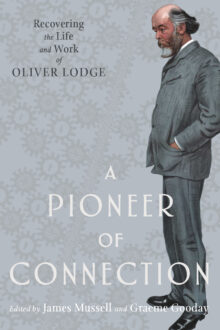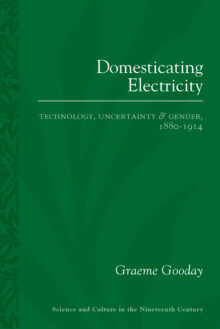
Graeme Gooday
Graeme Gooday is professor of the history of science and technology, in the School of Philosophy, Religion, and History of Science at the University of Leeds. He is the author of The Morals of Measurement: Accuracy, Irony and Trust in Late Victorian Electrical Practice, Domesticating Electricity: Technology, Uncertainty and Gender in Late Nineteenth-Century Culture, 1880-1914, and, with Stathis Arapostathis, Patently Contestable: Electrical Technologies and Inventor Identities on Trial in Britain.
A Pioneer of Connection
Recovering the Life and Work of Oliver Lodge
Sir Oliver Lodge was a polymathic scientific figure who linked the Victorian Age with the Second World War, a reassuring figure of continuity across his long life and career. A physicist and spiritualist, inventor and educator, author and authority, he was one of the most famous public figures of British science in the late nineteenth and early twentieth centuries. A pioneer in the invention of wireless communication and later of radio broadcasting, he was foundational for twentieth-century media technology and a tireless communicator who wrote upon and debated many of the pressing interests of the day in the sciences and far beyond. Yet since his death, Lodge has been marginalized. By uncovering the many aspects of his life and career, and the changing dynamics of scientific authority in an era of specialization, contributors to this volume reveal how figures like Lodge fell out of view as technical experts came to dominate the public understanding of science in the second half of the twentieth century. They account for why he was so greatly cherished by many of his contemporaries, examine the reasons for his eclipse, and consider what Lodge, a century on, might teach us about taking a more integrated approach to key scientific controversies of the day.
Domesticating Electricity
Technology, Uncertainty and Gender, 1880–1914
This is an innovative and original socio-cultural study of the history of electricity during the late Victorian and Edward periods. Gooday shows how technology, authority and gender interacted in pre-World War I Britain. The rapid take-up of electrical light and domestic appliances on both sides of the Atlantic had a wide-ranging effect on consumer habits and the division of labour within the home. Electricity was viewed by non-experts as potential threat to domestic order and welfare. This broadly interdisciplinary study relates to a website developed by the author on the history of electricity.


